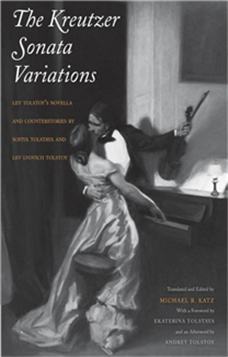 “The Kreutzer Sonata” is a controversial novella by Leo (Lev Nikolaevich) Tolstoy. It was banned in several countries because of its provocative message and because of what was considered at the time prurient content. If your nature contains an ounce of feminism, it will enrage you. Yet its origins are in eccentric ideas that Tolstoy almost certainly considered to be for the benefit of women.
“The Kreutzer Sonata” is a controversial novella by Leo (Lev Nikolaevich) Tolstoy. It was banned in several countries because of its provocative message and because of what was considered at the time prurient content. If your nature contains an ounce of feminism, it will enrage you. Yet its origins are in eccentric ideas that Tolstoy almost certainly considered to be for the benefit of women.
The Kreutzer Sonata Variations brings together this work with others by the family on the same subject. Tolstoy’s wife Sofiya Andreevna (I’m using the spelling from the book) disliked the novella intensely and wrote two stories in answer to it, “Whose Fault?” and “Song Without Words.” These stories were suppressed by the family. Tolstoy’s son, Lev Lvovich, also wrote a story, “Chopin’s Prelude.” These stories are followed by a section including review comments by several contemporaries, excerpts from diaries, and other writings of all three Tolstoys.
So, what was “The Kreutzer Sonata” about and why did it evoke all this controversy? It is a virtually plotless story about a man who meets another man on a train journey and tells him the story of why he murdered his own wife. Throughout the story, the main character, Pozdnyshev, expresses abhorrent opinions about women, sex, and marriage, and shows no understanding of women at all. Although this character is not completely describing Tolstoy’s own marriage, he is giving voice to Tolstoy’s ideas about marriage. This story is harsh, disturbing, and reflects ideas that show no understanding of human nature, or for that matter, many other things. Tolstoy posits that marriage is simply legal prostitution, that sex is disgusting, and that people should just strive to be celibate (something he notoriously had a problem with). Because Tolstoy saw his role in later years as one to instruct and had too high an opinion of his own ideas, this information is presented didactically, in a polemic.
Sofiya Andreevna disliked the novella intensely and was embarrassed by it, because she believed that others thought it reflected her own marriage. She insisted it did not but mostly, I think, because she didn’t want people to think she became attached to another man while married to Tolstoy (and who would blame her?). She also felt that the story showed no understanding of the wife, and so she wrote her own story. In both, the story is basically the same, a madly jealous husband comes to believe his wife is unfaithful when she is not and kills her in a fit of anger. It was Sofiya herself who convinced Tolstoy that his story would be more effective if the wife was innocent.
It is in the context of the responding stories and other writings that “The Kreutzer Sonata” is most involving. The story itself is ridiculous to modern sensibilities. Two pages of quotations by contemporaries provide some interest, particularly the two (not surprisingly) that I most agree with.
No wonder the Countess was often near the end of her patience.—George Bernard Shaw
“The Kreutzer Sonata” is a nightmare, born of a diseased imagination. Since reading it I have not the slightest doubt that its author is cracked.—Émile Zola
For an enlightening look at the Tolstoy’s marriage, I recommend the novel The Last Station by Jay Parini.
Related Posts
The Possessed: Adventures with Russian Books and the People Who Read Them
